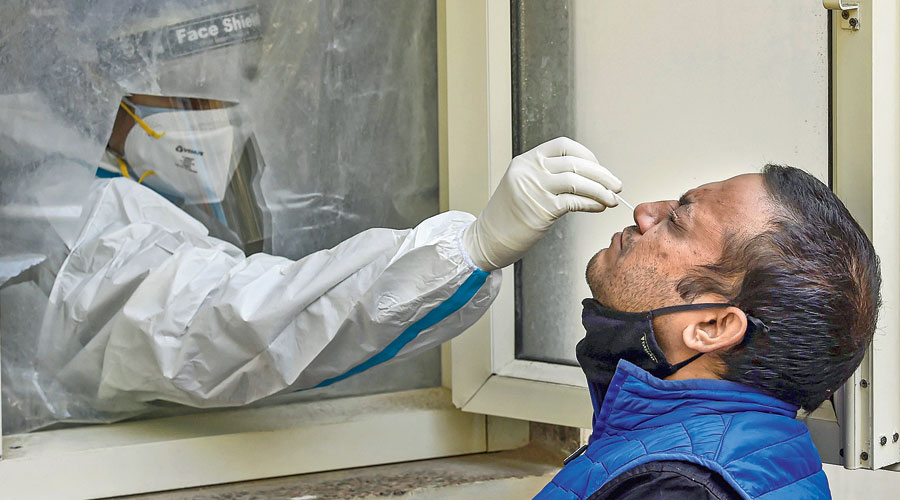The unusual mutant variant of the novel coronavirus observed in the UK and a few other countries has not been seen in India yet, according to scientists familiar with the genome sequences of over 4,000 viruses from India.
The variant named B.1.1.7 has an unusually large number of genetic changes and scientists believe one of these mutations helps the virus gain efficiency at entering human cells while another mutation appears to help the virus evade human immune responses.
Several of the mutations have emerged in the coronavirus spike protein that the virus uses to enter human cells and is the focus of most vaccines against the coronavirus disease designed to generate immune responses against the spike.
“Mutations by themselves are not surprising in viruses, but this set of mutations is something we need to note and watch,” said Anurag Agrawal, director of the Institute of Genomics and Integrative Biology, New Delhi, a lab engaged in analysing genome sequences.
Agarwal told The Telegraph that B.1.1.7 has not been detected among Indian coronavirus samples sequenced so far. An online database of coronavirus genomes maintained by the IGIB has until now analysed 4,338 genomes and found 5,574 unique variants.
While the mutations appear to increase the efficiency of transmission, Agrawal said, there is no evidence yet that they have any implications for either the severity of the infection or the need for hospitalisation.
A consortium of UK scientists studying the coronavirus genome has reported that the earliest genomes belonging to the B.1.1.7 lineage were collected in September in Kent and Greater London but the cluster has grown rapidly over the past four weeks.
By mid-December, Andrew Rambaut at the University of Edinburgh and his colleagues across the UK had compiled 1,623 genomes of the B.1.1.7 lineage of which 519 were sampled in Greater London, 555 in Kent, 545 in other regions of the UK and four in other countries.
The UK scientists have pointed out that one of the mutations in B.1.1.7 named N501Y helps the virus increase its binding affinity to molecular gateways the virus uses to enter human cells. And another mutation 69-70 del could arm the virus with the capacity to evade the human immune response.
A study by two US researchers had last week suggested that mutated versions of the novel coronavirus could retain the ability to bind to human cells even while evading antibodies and underlined the need for smarter vaccine designs.
The researchers analysed around 147,000 viral genome sequences and found several mutations that could disrupt the spike protein-antibody interface in such a manner that the virus is able to continue binding to its entry gateway into human cells.
The findings have “two important implications,” Paul Axelsen, professor of pharmacology, biochemistry, biophysics and medicine and his collaborator wrote in their paper describing their analysis of these mutations.
Mutated versions of the coronavirus may be able to reinfect people who have recovered from an earlier infection and vaccines with only one variant of the spike protein may induce little protection against variants already circulating in human populations, the researchers wrote.
Vinod Scaria, a senior bioinformatics researcher at the IGIB said there is already significant evidence for the emergence of such antibody escape mutations in coronavirus variants.
“There are around 100 such variants with the capacity to evade various antibodies,” Scaria told The Telegraph. “It is a theoretical possibility that when vaccines are widely deployed, the virus might undergo a selection pressure and develop mutations biological advantageous to evade specific antibodies.”
Scientists say the findings point to the need for continued surveillance for viral mutations after vaccines are deployed. “There is no way to say what mutations will come up when vaccines get deployed in large parts of the world,” said Shahid Jameel, a senior virologist and director of the Trivedi School for Biosciences at Ashoka University, Sonipat (Haryana).
“Vaccine escape mutants could come up but how they will affect virus fitness is unknown,” Jameel said. “It would be a very thin edge for the virus to escape a vaccine but not reduce its virulence and fitness.”











